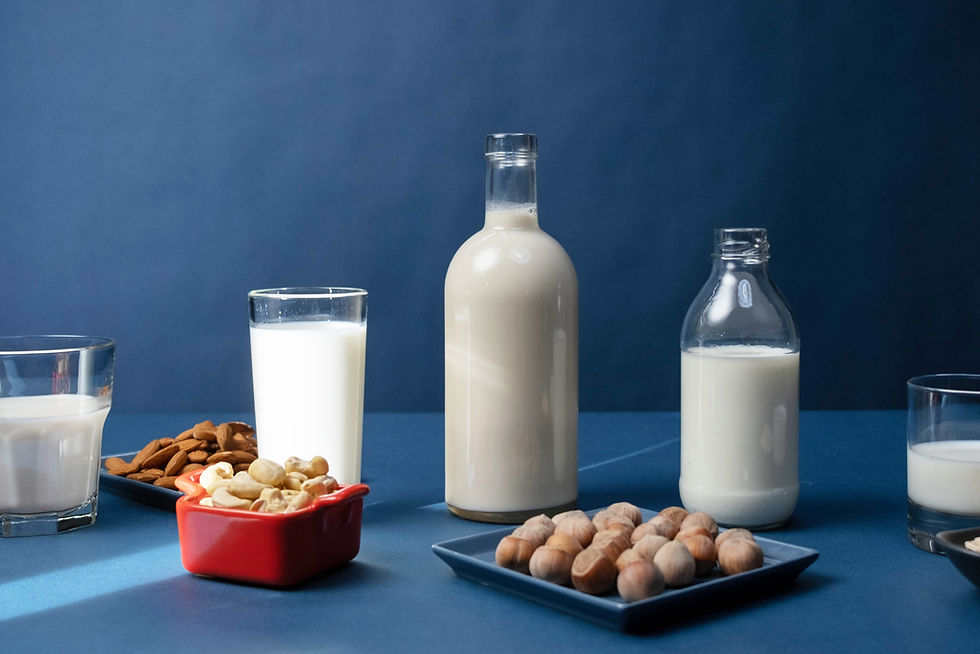The Dairy Debate for Weight Loss
- Sarah Rood
- Dec 9, 2024
- 3 min read
Updated: Jun 3, 2025

When it comes to losing weight, dairy is often a controversial topic. Some diets suggest eliminating it altogether, while others highlight its benefits for bone health, muscle maintenance, and satiety. If you're wondering whether dairy can fit into your weight loss plan, the answer largely depends on your goals, dietary preferences, and how your body responds to it. Here’s a breakdown of what you need to know about dairy and weight loss.
The Nutritional Profile of Dairy
Dairy products like milk, cheese, and yogurt are packed with essential nutrients, making them a staple in many diets:
Protein: Important for muscle repair and maintaining fullness, helping you eat fewer calories overall.
Calcium: Supports bone health and may play a role in fat metabolism.
Vitamins and Minerals: Dairy is rich in B vitamins, potassium, and phosphorus.
Carbohydrates and Fat: The carbohydrate (lactose) and fat content varies across dairy products, which can influence their impact on weight loss.
Can Dairy Help with Weight Loss?
Dairy can support weight loss when included strategically. Here’s how:
Satiety Boost: Protein-rich options like Greek yogurt and cottage cheese help you feel full longer, reducing snacking and overeating.
Muscle Maintenance: Protein also helps preserve muscle mass during weight loss, keeping your metabolism active.
Low-Calorie Options: Low-fat or fat-free dairy products can provide the benefits of dairy without excess calories from fat.
Not all dairy is created equal. To make the most of dairy while losing weight, choose options that align with your goals:
Best Choices for Weight Loss:
Plain Greek Yogurt: High in protein and lower in sugar compared to flavoured varieties.
Low-Fat Cottage Cheese: A protein powerhouse that pairs well with fruits or veggies.
Unsweetened Milk Alternatives: Almond, soy, or oat milk can provide a low-calorie alternative (though they may lack dairy’s protein content).
Hard Cheeses: Parmesan or cheddar can be enjoyed in moderation as they’re more concentrated and flavourful.
Limit These Options:
Flavoured Yogurts: Often loaded with added sugars.
Full-Fat Cheeses: Calorie-dense and easy to over-consume.
Ice Cream and Cream-Based Products: High in sugar and saturated fats.
When to Be Cautious with Dairy
While dairy can be a part of a healthy weight-loss plan, there are scenarios where caution is warranted:
Lactose Intolerance or Sensitivity: If dairy causes bloating, gas, or digestive discomfort, it may hinder your weight-loss progress. Lactose-free options or dairy substitutes can help.
Caloric Overload: Even healthy dairy options can derail weight loss if consumed in excess.
High Saturated Fat Content: Full-fat dairy products can contribute to a higher calorie intake and elevated cholesterol levels for some people.
Tips for Incorporating Dairy into Your Weight Loss Plan
Pair Dairy with Fibre: Combine Greek yogurt or cottage cheese with fruits, nuts, or seeds to enhance satiety and nutrient density.
Mind Your Portions: Stick to recommended serving sizes to avoid overdoing it.
Opt for Unsweetened Varieties: Added sugars in flavoured yogurts or milk can sneakily increase your calorie intake.
Consider Timing: A protein-packed dairy snack post-workout can aid recovery and muscle growth.
Listen to Your Body: Monitor how you feel after consuming dairy. If it doesn’t sit well with you, explore alternatives like plant-based options or fortified nut milks.
Dairy Alternatives for Weight Loss
If you’re avoiding dairy due to allergies, intolerance, or personal preference, there are plenty of nutritious alternatives:
For Milk: Unsweetened almond, cashew, soy, or oat milk.
For Yogurt: Coconut, almond, or soy-based yogurts. Look for unsweetened varieties.
For Cheese: Nutritional yeast or plant-based cheeses made from cashews or almonds.
Dairy can be a valuable tool in your weight loss journey when consumed mindfully. Its high protein content, paired with essential nutrients like calcium, makes it a convenient and versatile option for many people. However, it’s not a one-size-fits-all solution. Experiment with different dairy products and listen to your body to find what works best for you.
Ready to start your weight loss journey? Take our easy online assessment to see if you qualify.
.png)


